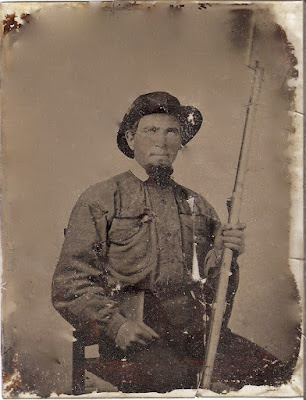Within a Square of the Tishomingo Hotel: At Corinth with the 42nd Alabama
“Rumors have gone forth and some of them have been published making matters much worse than I have detailed them,” one correspondent wrote to the Atlanta Southern Confederacy in the days after the Battle of Corinth. “The future is dark in this part of the country, and I fear other reserves are in store for us, including the loss of much ground now held by us.”
Newspapers
throughout the South, starved for news about the events at Corinth in October
1862 took to republishing articles from Northern newspapers but occasionally a
word from a direct participant made the pages. The Mobile Register &
Advertiser took a more personal route by conducting direct interviews with
soldiers on leave from Price and Van Dorn’s army. One of those soldiers was
Colonel John W. Portis of the 42nd Alabama Infantry.
 |
| Private Patrick McGlynn, Co. H, 42nd Alabama Infantry (Photo courtesy of Stan Hutson) |
Portis’
regiment had been devastated at Corinth. Assigned to General John C. Moore’s
brigade of General Dabney Maury’s division of Sterling Price’s Army of the
West, the regiment went into action on Friday October 3rd with 530
men and barely a corporal’s guard of them could be gathered by Sunday night. “We
have not been able to obtain particulars of the casualties but the record, we fear,
will be sad enough. The 42nd Alabama went into the fight of Friday
530 strong; on Saturday it mustered about 300 and on Sunday evening a staff
officer met the major with only 8 or 10 men, who were all he said he was able
to gather of the regiment. The rest were either killed, wounded, prisoners, or
had fallen by the way from weakness. On Sunday an order was sent to General
Maury to make a charge with his division, but this gallant officer was forced
to reply that he had scarcely two regiments left fit for duty.”
Portis himself was sent home to Mobile on the orders of the surgeons; the Colonel had been concussed by the explosion of shell nearby which had killed two others and knocked Portis to the ground insensible. His account of the Battle of Corinth originally saw print in the Mobile Register & Advertiser and was republished in the Alabama Beacon from Greensboro.
The battle was
opened on Friday last commencing at 8 o’clock in the morning and continued
without cessation until 8 o’clock at night. Our forces numbered about 20,000
fighting men under the command of Major General Earl Van Dorn, and they fought
with a desperate valor not exceeded by any troops during the war.
It appears
that our Generals or at least the General in command were terribly deceived,
having been lured by the enemy into a trap carefully prepared for them and made
to fight against heavy odds without the hope of any substantial advantage for
this waste of blood and life. The movement on Corinth was made from the west,
the enemy withdrawing his pickets at our approach, destroying camps, strewing
the way with knapsacks, guns, clothing, etc. until he reached the first line of
his entrenchments where he made a resolute stand. Our men rapidly pursued what
they supposed was a flying enemy, counting on a bloodless victory, some of the
Generals even expecting to obtain possession of the town without firing a gun.
Their eyes were opened when they saw the serried ranks of the enemy prepared to
receive them and they then knew that a hard and bloody fight was at hand.
 |
| Colonel John Wesley Portis of the 42nd Alabama with his wife Rebecca |
Moore’s
brigade of Maury’s division led the advance and the battle soon raged hot and
furiously. The enemy fought well, better it is said than ever before in the
West, but they could not withstand the furious charges of our gallant men who
steadily gained upon them, driving them from entrenchment after entrenchment
until night closed upon the scene.
The next day
the fight was resumed; the enemy meantime having been heavily reinforced, but
our troops again pressed forward gaining the town of Corinth and the gallant 42nd
Alabama planting its colors within a square of the Tishomingo Hotel. It became
evident, however, that the struggle was too fierce to be continued by our
advancing forces whose ranks were being fearfully thinned and worn down by
fatigue and hunger while the enemy was being considerably reinforced.
Meanwhile, the Federals had thrown a heavy force estimated at 20,000 men from
Bolivar to the south of Corinth with the design to cut off our retreat and bag
our whole army. These fresh troops were met with unexampled bravery and vigor
by our jaded men in the sanguinary engagement of Sunday at Pocahontas which
resulted in the discomfiture of the foe and thanks to the genius and experience
of General Price in the escape of our army by an improved road to a point west
of Ripley where they made a stand.
 |
| Private John Emmet Wilson, Co. D, 42nd Alabama Infantry |
The battle of Friday is said to have been the hottest and most desperate of all. Soldiers who were in the battle of Shiloh say it was more terrible than that memorable conflict. The enemy appears to have been thoroughly posted with regard to our movements. They knew when a given division passed a given point, what was its strength, the direction of its march, how, when, and where the attack was to be made; in short, everything they wished to know and of course could make all the preparations they desired to meet us.
 |
| Private Thomas Lambert, Co. C, 42nd Alabama Infantry |
Source:
Interview with Colonel John W. Portis, 42nd
Alabama Infantry, Alabama Beacon (Alabama), October 24, 1862, pg. 2











Comments
Post a Comment